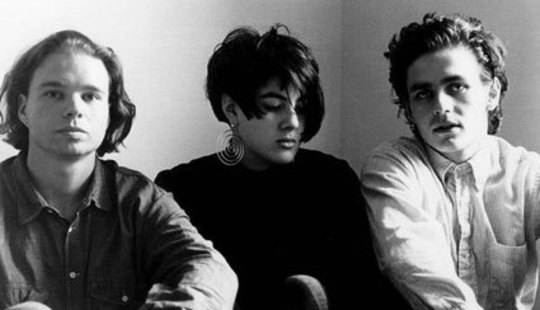Galaxie 500 are widely considered one of the essential and definitive bands of the 1980s American indie underground. It hasn’t always been like this. Before their rediscovery and clear influence on today’s new American indie underground such as Atlas Sound, Xiu Xiu, Beach House, and scores of others, the band were passed along like a secret. Underrated and little known while they were together, Galaxie 500 eschewed rock music’s growing penchant for slick expansive arrangements, instead specializing in minimal outsider music and obsessing in cyclic song-structures that paved the way for today’s indie community.
It is difficult to think about Galaxie 500 without the looming spectre of their most immediate influence: Velvet Underground. The blueprint is there at the root but Galaxie 500 twist it into their own narrative, replacing aloof NY cool with itchy suburban innocence. Whereas Velvet Underground came across as New York City’s poet laureates, Galaxie 500 freak out in the city, unable to escape themselves. DrownedInSound's Hari Ashurst and Jordan Dowling take a look at a history cut much too short. HA

Today
Debut album Today revels in an obsession with stillness. The arrangements are sparse and filled with repeated phrases. In Pictures the drums are deceptively functional - barely rising above muted time keeping duty, as Dean Wareham sings recurring, simplistic lines about his head full of wishes and colour. As the meekly sung vocal trails off, guitar gleams into life, adorned with the colour and wishes that Wareham sang about. Stylistically the song isn’t typically ‘slowcore’ but the movement’s obsession with sonic space and texture is prototyped in songs like this.
On 'Parking Lot' the band’s unwavering obsession with the unspoken elements on the fringes of life comes in to view as Wareham sings about “Sitting on a subway train/ Watching all the people lose their senses/ Hiding in a parking lot/ Watching all the people fall to pieces”. It’s easy to get a sense of the 1980s outsider figure that characterizes a lot of American underground indie music. There is an ‘us and them’ element, and as Wareham takes notes on a life that he isn’t included in, the simplistic and droning arrangements begin to make sense as a backdrop to his sensory overload freak-outs.
First single and album closer ‘Tugboat’ remains one of the bands most compelling moments. The usual elements of Galaxie 500’s composition underpin Wareham’s vocals treated with timed delay that slurs lines into other lines as he sings “I don’t wanna stay at your party/ I don’t wanna talk with your friends” before his remonstrations eventually give way to a mantra-like chorus of “There’s a place I’d like to be”. After the second chorus an extra snare hit is added and this small change propels the song into yet more flourishing guitar lines and despite the understated style, the casual simplicity of the music, Galaxie 500 manage to capture a feeling of glory and drama.HA
On Fire
Stylistically On Fire is barely a departure from Today; there is barely any differentation from the Gmaj/Dmaj chord sequences and icy wailings of their debut full-length, and yet it is still a massive step-up, seeing the three-piece harness their barely-there instrumentation into a much stronger end product.
There is still a nervous air, an uneasiness perhaps due to frictions already existing in the band, but the album as a whole is more 'comfortable', as strange a descriptive as that seems to tag onto such a band. There is much more flow between songs, and the almost peak-and-trough like quality of their debut is gone, in its place an often overlooked consistency.
Despite this there are highlights. 'Snowstorm' is arguably the bands most referenced song, despite being unusually complex in its structure. It offers a postcard image of Galaxie 500's wintry, desolate sound, with Dean's lyrics bending further from nonsense than is typical into a tale of impending disaster (or solitude).
The following track 'Strange' is another highlight, a paranoid, at times incomprehensible jaunt riding on broken cymbals and acoustic guitars. Dean's vocals strain out of tune and sequence, an obvious inspiration for Jeff Magnum/Neutral Milk Hotel's move from field recordings and failed experiments to off-kilter wonderment.
The penultimate track 'Ceremony' is one of the band's most ambitious. Covering Joy Division is inadvisable for any band, never mind one with such a disparate and uncompromising sound as Galaxie 500, and yet somehow they make it work, twisting the original into a lighter, yet no more welcoming, form. It is at this point perhaps where the bands 'identity' is more apparent than any other. JD
This Is Our Music
The title is a neat reflection of Galaxie 500 presenting what is arguably the most definitive and most successful version of their aesthetic. Their third and final album is consistently inventive and brilliant. The blueprint laid down on their first two albums is perfected and organ-lines on ‘Sorry’ and new guitar effects add even more depth and warmth to their sound.
Opener ‘Forth of July’ serves as a distillation of the brilliance found else where on the record. The song is untouchably classic, from the slow-fused feedback that lights the opening guitar passage, to the dramatic soundscape at the very end of the song. It drips with a soothing background of fuzz and driving, triumphant guitar chords.
Wareham begins his timeless outsider narrative with “I wrote a poem on a dog biscuit/ But your dog refused to look at it/ So I got drunk and looked at the Empire State Building/ It was no bigger than a nickel”. There’s an inherent loneliness that underpins this ironic paean to independent living, but the way that Wareham delivers the lines, and the glory of the music, makes all else seem irrelevant; all that matters is the present, the very moment of the song.
In the second verse Wareham "Pulls the shades/ So I didn’t have to see the sky/ I decided to have a bed in/ But I forgot to invite anybody." Unlike John and Yoko the peace Wareham is protesting for is his own peace and quiet; the ability to shut out the world. The singing subsides while drum rolls creep into the mix, darting around reverb anchored guitar lines as the song opens out. The drums crack and fizz with urgency towards the end of the song, sounding like fourth of July fireworks and the snare rolls that finish the song not only perfectly capture the claustrophobia of fireworks, the tension and release, but the lonely thought posited by Wareham’s one man bed-in scene that for every snare hit, every roll and bang of a firework there are other people together, elsewhere. HA
CONCLUSION
The story of Galaxie 500 was over before enough paragraphs had been written. To continue the metaphor: they were a band deserving of enough books to dwarf Ptolemy's exhaustive collection. Sure, off-shoots have appeared; Luna, Dean & Britta and Damon & Naomi all feature member/s of Galaxie 500 and have taken the icy beauty of their former bands into new directions, but they have for the most part failed to capture the magic contained on the bands trinity of full-lengths (not taking to account the fourth disc of lost tracks found on the exhaustive but unmissable 4CD boxset available through Rough Trade).
Galaxie 500 influenced many of the bands since labelled slowcore, and as the primordial shoegaze band they who sound the least dated, perhaps due to their shunning of of-the-time equipment and studio-wizardry. A reminder perhaps that true beauty is eternal, and as perfect an example of the fact that sometimes the most sparse music is the most powerful. JD






















